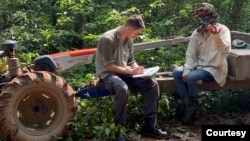A journalist who covers environmental issues from Cambodia has been banned from entering the country where he has been based for the past five years.
British reporter Gerry Flynn told VOA that immigration officials denied his re-entry to Cambodia on Jan. 5, when he tried to return after a vacation in Thailand.
The journalist went public with the incident Monday.
“It’s not just a professional blow, but very personal, too,” Flynn told VOA by phone. “We’ve all seen in the last five years, press freedom [has] deteriorated there.”
Flynn, 33, is staff writer at Mongabay, a news website that reports on environmental issues worldwide. He has spent five years reporting from Siem Reap in Cambodia’s northwest, covering environmental and governance issues.
The first sign of a possible problem came on January 2, when Flynn says he was stopped at the Siem Reap-Angkor International Airport prior to departing Cambodia.
Authorities told Flynn that one of the documents in his visa applications was fake. But, the reporter said, he was allowed to embark on his trip to visit Moo Deng, a baby endangered pygmy hippopotamus that has become a worldwide tourist attraction in Thailand.
When he returned three days later, Flynn said he was questioned again.
“This time they didn’t mess around. They were just straight away saying that my visa had been acquired fraudulently. They couldn’t tell me which document was supposed to be incorrect or fake,” he said. “The only thing they would tell me is that I’d been placed on the blacklist on November 25, 2024.”
Immigration officials told Flynn he was banned indefinitely and would not be able to return to Cambodia. Denied entry, the journalist traveled back to Thailand.
Flynn has a one-year Type E business visa, valid through February 2025, and a valid work permit issued by Cambodia’s labor ministry. His press accreditation expired January 1, but he had applied to renew the pass.
His news outlet, Mongabay, has said that it believes the action is retaliatory.
Flynn recently featured as a contributor to a France24 documentary, “Real carbon, false credits? Investigating mass deforestation in Cambodia”.
The documentary focuses on carbon-offset projects in the Cardamom Mountains. After it aired on November 22, Cambodia’s government labeled the findings "fake news.”
Two other contributors were detained a day after it aired, but later released, according to Mongabay.
Neither Cambodia’s government, Ministry of Foreign Affairs nor its press communications division replied to VOA’s emails requesting comment.
Mongabay on Monday said Cambodian authorities have not provided further information to Flynn about his case or his options to appeal.
In a statement, Mongabay said that Cambodia claims Flynn had applied for a visa to work as an electrician. But Mongabay said Flynn has “consistently held a valid government-issued press pass ... in Cambodia.”
“For more than five years, Flynn has reported from Cambodia, and despite the increasing hostility towards journalists, it’s a country that he’s grown to love,” the statement said. “As such, it’s both a professional and personal blow to be uprooted from the country Flynn has called home in what appears to be direct retaliation for his journalistic work.”
International media watchdogs have condemned Cambodia’s action.
“The immigration entry ban on journalist Gerry Flynn shows just how far Cambodian authorities are willing to go to suppress independent reporting on the country’s environmental catastrophe,” Shawn Crispin, the senior Southeast Asia representative for the Committee to Protect Journalist, told VOA by email.
Crispin noted that Flynn has reported on deforestation in Cambodia, adding, “His expose journalism no doubt made people in powerful positions who profit from the illegal trade very uncomfortable.”
Phil Robertson, director of Asia Human Rights and Labor Advocates, told VOA, "Cambodia is working overtime to wipe out what's left of media freedom in the country.”
Reporting or campaigning about environmental issues in Cambodia can be risky.
Local journalist Chhoeung Chheng died from his injuries after being shot in Siem Reap province in December while investigating deforestation.
In July, 10 members of Cambodian environmental activist group Mother Nature were sentenced from six to eight years in prison for conspiring against the state.
The group had been investigating waste pollution in Phnom Penh’s Tonle Sap River. Mother Nature had campaigned against the destruction of natural resources throughout Cambodia and corruption.
Overall, Cambodia has a poor record for press freedom. It ranks 151 out of 180 on the World Press Freedom Index, where 1 shows the best media scene.
Reporters Without Borders, which compiles the index, describes a “legacy of repression against the independent media.”
In November, an investigative journalist who helped expose the existence of massive scam centers in Cambodia announced that he was quitting.
The journalist, Mech Dara, was detained for 30 days and charged with incitement, which carries a potential sentence of up to two years in prison.
Two other local reporters who investigated mistreatment of workers at a scam center were detained in late January, according to watchdogs.
Flynn, who is the president of the Overseas Press Club of Cambodia, said that until recently Cambodia “refrained from going after foreign journalists.”
“All journalists, whether foreign or Cambodian all face varying levels of harassment in the field. I know some who were arbitrarily detained while working," he said.
According to a quarterly review report from the Cambodian Journalist Alliance, more than a dozen journalists were legally or physically harassed between July and September of 2024.
Reflecting on his case, Flynn said, “I think the biggest annoyance is it has eaten the whole month, when in reality that month should have been spent continuing to report on important issues in Cambodia.”
“For me it’s obviously a setback but it is not going to stop either myself or others from reporting on issues related to the environment,” Flynn added. “I don’t think silencing journalists is going to prevent people from seeing the problems that are happening.”






